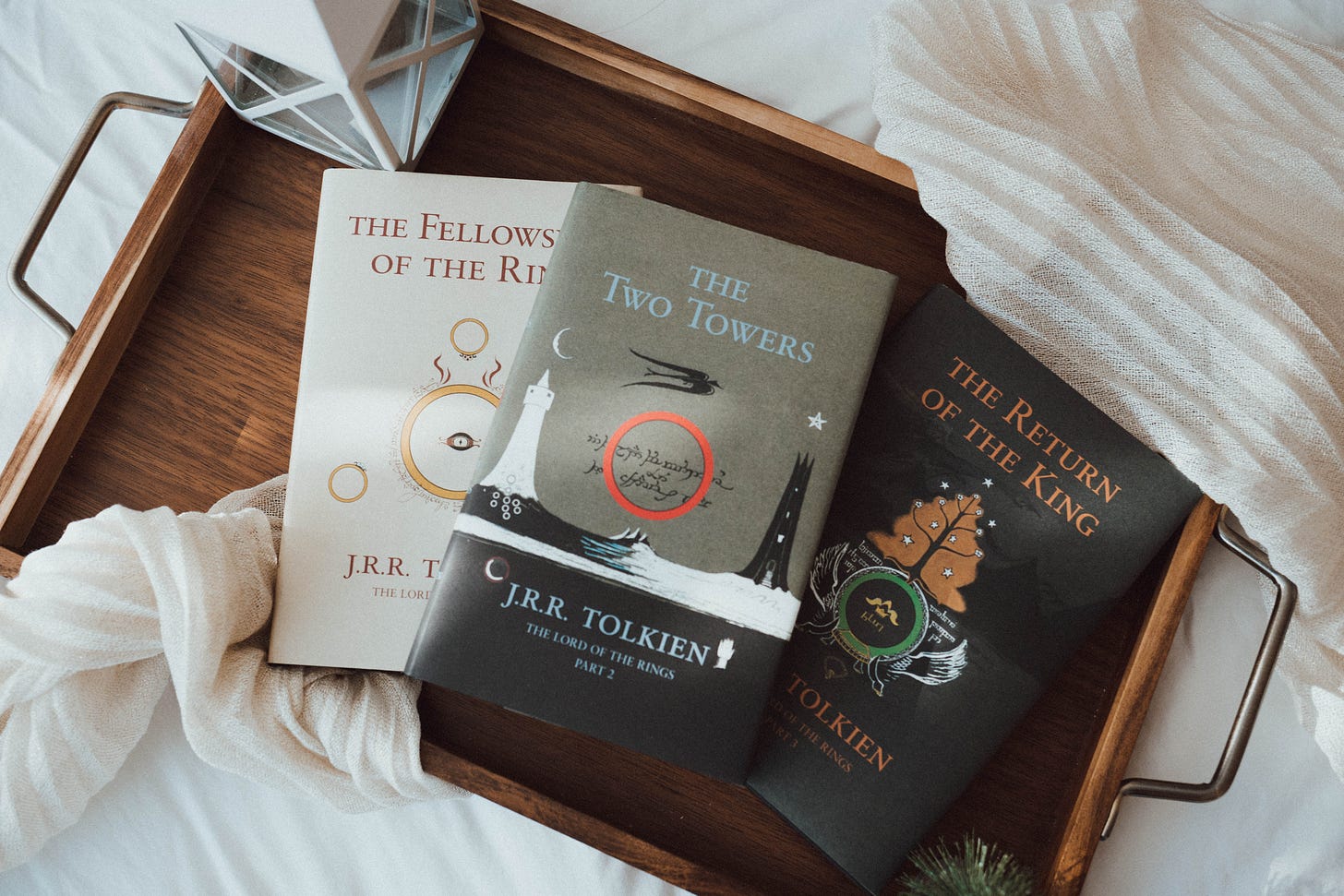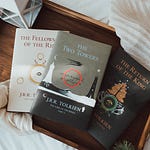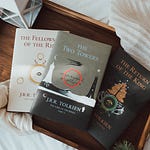Hello and welcome to Notes from the Town Hermit, a haven for the overthinkers and deep-feelers who search for reasons why life should be worth living. These letters are a labour of love, so if you have the means and want to support my writing, please upgrade for full access.
Dear Inklings,
We are finishing up The Fellowship of the Ring by J.R.R. Tolkien this week. If you’re new here, my essays for this book challenge will always be free to read, but the journaling exercises and discussions are for paid Inklings. I also share more of my personal experiences in that section. We will be going deep and I want the space to be an intimate one. I hope you will choose to participate in our Fellowship.
Click here for the main page and reading schedule.
The fellowship has entered Lothlórien after losing Gandalf in the mines of Moria, where they gain some reprieve from their anguish. It is a heavy loss—the first of many to come. The intertwining of grief and love will continue to form the heartbeat of the series. In our reading this week, we see it unfold in several aspects:
The fall of Gandalf
Frodo’s quest as “the footstep of Doom”
Gimli’s love for Galadriel
The breaking of the fellowship
During Frodo’s conversation with Galadriel, she tells him whether he succeeds or fails, the result bodes ill for the elves. If he fails, Sauron will be able to see the hidden elven rings; if he succeeds, all the rings’ power is broken, include that of the elves’, which is bound to Sauron’s One Ring. Though the three elven rings have been used to preserve beauty and goodness, the defeat of evil will also diminish all such magic. The world as they know it will fade away.
Gimli falls in love with his enemy
Gimli the dwarf also undergoes a significant change. As has been hinted at throughout the narrative, dwarves and elves have a longstanding enmity with each other. Yet when he meets Galadriel, she does not shun him; she speaks of his ancestral homes with reverence and in his own language. She validates his desire to see Moria in spite of the dangers.
And the dwarf, hearing the names given in his own ancient tongue, looked up and met her eyes; and it seemed to him that he looked suddenly into the heart of an enemy and saw there love and understanding. Wonder came into his face, and then he smiled in answer.
How incredible is this?
So much fear and anger exists between people, and how easily we can see each other as enemies or “others.” I’m not so naive as to think that just listening and talking will solve all problems, but it is a starting point—one more powerful than we might think.1 I think of Daryl Davis, a black man who convinced 200 KKK members to forsake their hateful ideologies by befriending them.
Galadriel’s effect on Gimli lasted his entire life. I don’t think it’s a coincidence that Gimli and Legolas were able to form such an intimate bond just after this encounter.
But after being touched so deeply, Gimli leaves behind his newfound love and continues on the quest with his companions. He laments, “Torment in the dark was the danger that I feared, and it did not hold me back. But I would not have come, had I known the danger of light and joy. […]”
Legolas responds, “[…] For such is the way of it: to find and lose, as it seems to those whose boat is on the running stream. But I count you blessed, Gimli son of Glóin: for your loss you suffer of your own free will, and you might have chosen otherwise.”
This theme calls to mind the well-known quote by C.S. Lewis from The Four Loves: “To love at all is to be vulnerable. Love anything and your heart will be wrung and possibly broken. If you want to make sure of keeping it intact you must give it to no one, not even an animal. Wrap it carefully round with hobbies and little luxuries; avoid all entanglements. Lock it up safe in the casket or coffin of your selfishness. But in that casket, safe, dark, motionless, airless, it will change. It will not be broken; it will become unbreakable, impenetrable, irredeemable. To love is to be vulnerable.”
My loss I suffered of my own free will
When I first connected with the boy who would become my son, Renley, I knew he would have the potential to break my heart. Ren had severe physical and mental health issues, long left untreated.
From the beginning, I was informed that perhaps he’d have ten years—if he took meticulous care of his health.
Of course, as those who have been reading for a while know, Ren’s health plummeted, and he died much earlier than anyone expected.
However, ten years or one year—my husband and I always knew we would likely outlive our son. We chose to adopt him anyway.
“The world is indeed full of peril, and in it there are many dark places; but still there is much that is fair, and though in all lands love is now mingled with grief, it grows perhaps the greater.”
Haldir’s words here resonate with me, as do Legolas’s to Gimli later. Grief is tightly intertwined with love. The longer we live, the more we will experience it.
As I shared in the first essay, I was once the person whose heart was locked in a casket, as C.S. Lewis described. It did not serve me well. Nowadays, I am much “squishier,” as one of my close friends would say. But I am also fuller, happier.
The breaking of the fellowship
The Fellowship of the Ring ends with the corrupting influence of the Ring overtaking Boromir at last, and the splintering of the fellowship. This group, held together by such a noble purpose, falls apart even after all they undergo together. The next two books follow separate storylines as a result.
Most strikingly, Frodo and Sam become separated from Merry and Pippin. Our core group of hobbits is split, and until the very end, neither has any idea if the other is alive or dead. Frodo and Sam continue on with dwindling hope.
In spite of separation, the remaining members of the fellowship think of each other constantly. They continue to hold each other in their hearts, even as they play their individual parts in pushing back against darkness.
How beautiful is the unity of souls across distance and time?
For next week, we will have a break. Start reading The Two Towers, up to Chapter 6: “The King of the Golden Hall.” The next essay will be published on 28 October.














